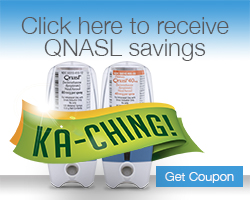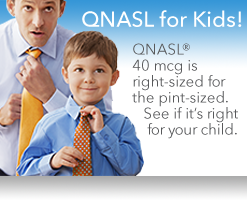APPROVED USES
QNASL® (beclomethasone dipropionate) Nasal Aerosol is a prescription medication that treats seasonal nasal and year-round nasal allergy symptoms in patients 4 years of age and older.
IMPORTANT SAFETY INFORMATION
Do not use QNASL Nasal Aerosol if you or your child is allergic to beclomethasone dipropionate or any of the ingredients in QNASL Nasal Aerosol
QNASAL Nasal Aersol may cause serious side effects including:
- Nose bleeds or nasal ulcers: QNASL can cause nosebleeds, sometimes severe, and nose ulcers. Tell your healthcare provider if you develop either of these after using QNASL.
- Fungal infections (thrush) in the nose, mouth or throat: a fungal infection in your nose, mouth, or throat may occur. Tell your healthcare provider if you have any redness or white colored patches in your mouth or throat.
- Slow wound healing: You should avoid using QNASL Nasal Aerosol until your nose is healed if you have a sore in your nose, you have had recent surgery on your nose, or if your nose has been injured.
- Eye problems: Some people who use corticosteroids may have eye problems such as blurred vision, increased pressure in the eye (glaucoma) or cataracts. If you have a history of blurred vision, glaucoma or cataracts or have a family history of eye problems, you should have regular eye exams while you use QNASL Nasal Aerosol.
- Serious allergic reactions: can happen in people taking QNASL Nasal Aerosol. Stop using QNASL Nasal Aerosol and call your healthcare provider right away or get emergency help if you experience shortness of breath or trouble breathing, skin rash, redness, swelling, severe itching, or swelling of your lips, tongue or face.
- Immune System Effects and a Higher Chance for Infections: Tell your healthcare provider about signs and symptoms of infection such as: fever, pain, body aches, chills, feeling tired, nausea and vomiting.
- Reduced Adrenal Function (adrenal insufficiency): Adrenal insufficiency can happen in people who take higher doses of QNASL than recommended over a long period of time. Symptoms may include feeling tired, weakness, dizziness, nausea and vomiting. Tell your healthcare provider if you experience these symptoms.
- Slowed Growth in Children: Children should have their growth checked regularly while using QNASL Nasal Aerosol.
The most common side effects with QNASL Nasal Aerosol 80 mcg in patients 12 years of age and older are nasal discomfort, nosebleeds, and headache.
The most common side effects with QNASL Nasal Aerosol 40 mcg in patients 4 to 11 years of age are headache, fever, infection of the nose and throat, and inflammation of the nose and throat.
Tell your healthcare provider if you have any side effect that bothers you or that does not go away.
These are not all of the possible side effects of QNASL Nasal Aerosol. For more information, ask your healthcare provider or pharmacist.
You are encouraged to report negative side effects of prescription drugs to the FDA. Visit www.fda.gov/medwatch, or call 1-800-FDA-1088







